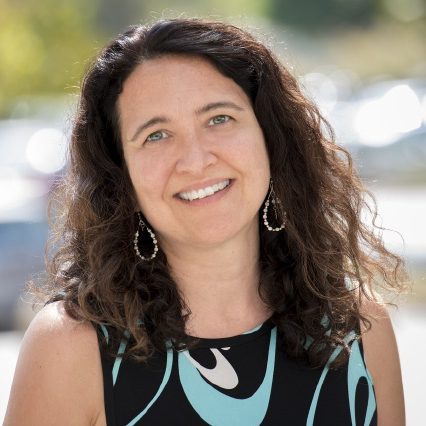Computer and Cognitive Scientist, SRI Education
Patricia Schank, PhD, specializes in the design of education technology informed by the learning sciences and human-computer interaction research. Trained as a computer scientist and cognitive scientist, she has more than 25 years of experience in leading participatory design, user experience, prototyping, and programming efforts to build STEM learning and assessment tools, collaborative learning environments, and community-based hubs to amplify the work of research and education professionals.
Schank’s recent work includes co-developing the website for SRI’s DaSy Center, a national technical assistance center that works with states to support IDEA early intervention and early childhood education, as well as sites to communicate research and resources related to multilingual learning, equitable college and career pathways, and evidence-based practices to support student well being. From 2013-2019, she served as Co-PI of the Center for Innovative Research in Cyberlearning (CIRCL), a hub for researchers who explore and investigate technologies that will be available to learners in 5-10 years. When CIRCL moved from SRI to Digital Promise in 2017, Schank moved to Digital Promise to continue co-leading the effort and serve as Director of Learner-Centered Design Research at Digital Promise. When CIRCL ended in 2019, she returned to SRI Education as a consultant.
Before CIRCL, Schank led SRI efforts to develop an online community infrastructure for educators (Tapped In), software to help students visualize nanoscale phenomena (NanoSense); and network technology for collaborative learning activities (Group Scribbles). In all, Schank has served as PI/Co-PI for 12 grants funding by the National Science Foundation (NSF) and co-authored more than 60 publications on the design, evaluation, and implementation of learning technology. She has also mentored girls in computer science and written about broadening participation in computer science.
Schank has an M.S. in computer science and a Ph.D. in education from the University of California at Berkeley, where her dissertation work focused on modeling and aiding scientific reasoning through an integration of theory-based cognitive simulations, experimental studies, and instructional curricula.
Current Projects
Past Projects
- CIRCL: Center for Innovative Research in Cyberlearning
- PACT: Principled Assessment of Computational Thinking
- STEMGenetics
- Tapped In: Teacher Professional Development Institute
Selected Publications
Roschelle, J. & Schank, P. (2020) Artificial intelligence & learning. In Center for Innovative Research in Cyberlearning, Ambitious mashups: Reflections on a decade of cyberlearning research. (pp. 8-10). Digital Promise.
Grover, S., Basu, S., & Schank, P. (2018). What We Can Learn About Student Learning From Open-Ended Programming Projects in Middle School Computer Science. Proceedings of the 49th ACM Technical Symposium on Computer Science Education (pp. 999-1004). Baltimore, MD: ACM.
Roschelle, J., Martin, W., Ahn, J. & Schank, P. (2017). Cyberlearning Community Report: The State of Cyberlearning and the Future of Learning With Technology. Menlo Park CA: SRI International.
DeBarger, A., Penuel, W. R., Harris, C. J., & Schank, P. (2010). Teaching routines to enhance collaboration using classroom network technology. In F. Pozzi & D. Persico (Eds.), Techniques for fostering collaboration in online learning communities: Theoretical and practical perspectives (pp. 224-244). Hershey, PA: IGI Global.
Schlager, M., Farooq, U., Fusco, J., Schank, P., & Dwyer, N. (2009). Analyzing online social networking in professional learning communities: Cyber networks require cyber-research tools. Journal of Technology Education, 60(1), 86-100.



